TRANSCRIPTION
Other than the population, what is one of the major differences about San Antonio from when you were growing up to now?
How much it's grown. As far as buildings and the tearing down of old buildings, when we lived in San Antonio, there were a lot of shanty places and houses where old people and minority people used to live, very small houses around the city, around the courthouse. There were a lot of full service gas stations. There was not that many restaurants, no Alamo domes, no big domes, nothing like that. Highways and streets have changed a lot. The cars are very different, although I believe that the cars back then were better made and lasted longer. Food market, we used to have Piggly Wiggleys, Handy Andy's, and a lot of mom and pop places have disappeared. The health care is better now because the minorities would not get the same treatment. They were also discriminated against more when it comes to law.
I love this picture. Can you tell me more about this picture such as how old were you, where is this and why are you not wearing any shoes?
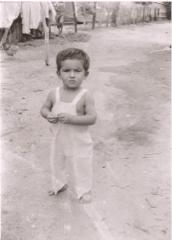
That was when we lived in Devine, Texas, in my grandmother's back yard. I am holding a nickel in my hands. I am not sure of the street. It was on the South end of Devine, which was a small town back then. The house was built with slats, up right, and inch and a half boards that covered the cracks, vertical also. We had chickens in the back and maybe ducks. I wasn't wearing any shoes because we couldn't afford them. My mom used to make my clothing including the coveralls in this picture. My haircuts were given by whoever was cutting hair in the family, mostly my dad. He would put a bowl on top of my head and just cut around it then trim whatever excess on the top. At this time it was my older sister and myself and maybe another younger sister, Mary.
Do you remember anything about traveling with your family during the migrant labor?
My dad used to drive a long flat bed truck with a canvas tarp on the top of it. It was about a 1938 truck and we used to carry different families with their belongings: their stove if they had one, their clothes, and just all of their necessities, because when we took them, it would be for the season and they'd have to live in houses that were kind of shanties. We used to have to cook on kerosene stoves and use kerosene lamps for light. Most of the times, we would eat beans and rice, meat not that often. Then for dessert, we probably would have sweet potatoes with milk or canned fruit cocktail. My dad was paymaster, he man he worked for had acres of cotton, so my dad would pick up the families from San Antonio or Devine Texas or other small towns around like Natalia, Lytle, and Pearsall Texas, and we would take them to Las Cruces and Macias Park, New Mexico. They would stay in their huts and my dad would drive them to the fields and then weigh their bags. They had to pick about 100 pounds or more to make it worth it. My dad would then pay them with crisp, brand new money. My dad would get mad at me because I would like to touch and play with that money. Mom and dad would go out to pick cotton also. My mom made me a little sack and I would walk along side her or dad and I would pick some cotton also, but I would get stuck with the end of the shells. So I stopped that, but I would pick cotton out of my mom's or dad's bag and put it into mine. I would also lie on their bag when I got tired and I would fall asleep until the end of the row
What did your father and mother do?
Before they got into migrant work, my dad was in Civil Service, and his dad talked him into going into migrant labor work when my dad fell off of a tower but was not seriously injured. He would do whatever his dad told him. But after, Mom was a house wife. Dad worked at a Sunset Full Service gas station. He became foreman of all of the Sunset gas stations. When the full service stations were becoming obsolete, his bosses sold out so he went to work at Sunglo for a while until all full service was gone. He then went to work at Riverside Mobile Home Park where he pretty much spent the rest of his life and he retired from there.
Describe a typical day growing upů
At 10 years old we were living on Brady Street. I was going to Ollie Perry Storm School. Mom would cook for us, iron and wash our clothes, and clean the house. Dad would bring the food home. I would go to school in the mornings, then at night mom would make us go to bed at a certain time. But we would watch television but it would be the adults programming. We watched a lot of wrestling, Mexican wrestling. We didn't watch boxing too much. Then when it got time to go to bed, we didn't have a tooth brush, so we brushed with our fingers. It wasn't a necessity like eating or drinking. We didn't have bottled water; we drank tap water no matter what type it was. We didn't know what we know now. On weekends, and after school, we would play outside with our friends. Sometimes dad would buy watermelons and have me sell some watermelon out on the sidewalk which I didn't like. A man would come by on a bike pulling a wooden cart selling cookies and they were so good. And then the ice cream man would come by in what looked like a shed today pulled by a white horse. Also a man who sold Fritos would come by and at that time there was a prize in them. That was a typical day. And then mom would have us say a rosary or a prayer at night which I didn't like because I had to be reading all the time.
Did you witness any discrimination and where you ever discriminated against?
I witnessed a lot of discrimination, especially with Anglos against the blacks and Mexicans. We weren't allowed in certain parts. And we would be called "wetbacks." In church, we sometimes weren't allowed to go out to church where the white people were at. We would have to go to where the Mexicans or Hispanics were at. We had separate areas during a parade and we were looked down upon most of the time. They treated us like nobodies. I hated it because my dad, when I got to knowing about what was happening, I would see my dad suck up to them and brown nosing them, which I wouldn't have done. He would say "yes sir" and "no sir" whether they were wrong or right. I didn't like that at all. When mom would take us downtown on the bus, when there were white people, we couldn't sit close to them. Same with the blacks, they couldn't sit close to the whites. But the white people had their choice; they could sit where ever they wanted. As far as the police, they would really discriminate. In a New York minute, they would try to give you a ticket, or get on you and beat you up or put you in jail for the slightest things. They would find a reason to do it. My dad would always be careful around them with what he did and what he said. I got to see a lot of it. And I still do.
What did your family and you do for fun?
Back then, for fun, dad would take us to Playland Park, which was an amusement park, we liked going there. It was a lot of fun. They would take us to the carnivals when they came to town. Mainly we played outside with our friends. We played ball, tag, hide and seek, and sometimes we would play wars by chunking rocks at each other. Nobody would get hurt. We would play basketball but we didn't have anything to throw the basketball in, well, what would be a basketball to us, we would just throw it into a tub on the ground. We would have play guns that we get for Christmas or birthdays and we would play cowboys and Indians, tie ourselves up. We never tried to burn each other though. Then during the summers, as dad was working for the Sunset stations, he would save up money, silver dollars. And when summer came around he would take us to New Mexico, where we would visit and stay with family because we couldn't afford to stay at a hotel or anything like that. There weren't that many that would take us anyway, accepting Hispanics.


What was it like being the oldest son of the family?
There wasn't much to it. There was nothing like "you're in charge. You lead them," or anything like that. As far as we were concerned, we were all equal. We did chores but they weren't designated for big people or smaller people, who ever could do it would get it done. Everybody pitched.
What was the major mode of transportation for your family while growing up?
We had cars. It started off with model T's, graduating into newer cars. Not really ever a pickup. My grandfather would have a pickup and he would always paint the fenders black and the body red. My dad would have different types of cars. He would have Pontiacs, Chevy's, and Chryslers'. He would have ramblers. He had a car that looked like a roly-poly bug. He had an earlier car with a rumble seat, Ford Model T, and I would like to sit back there in the rumble seat. At that time you never heard about safety or nothing like that. Mom and dad were in front and we were in the rumble seat and we could have fallen out and nobody would be none the wiser, until we got to where we were going.
When did you get your first car and what was it?
My first car I got when I got out of the service. It was a 1954 Crown Victoria Ford short block V-8. It had a white top and maroon bottom. I painted the wheels gold with white stripes, and white side walls. I would go to work with it. And on weekends I would go to Devine to visit my uncle. Actually it was to look up some girls over there. I had that Ford until I was coming back to San Antonio and somebody passed me up and made a gesture. He revved up his motor so I revved up mine and took off. I was beating him all the way until I blew the radiator on it. I had to call my dad, which I hated to do. When he asked what happened, I told him I don't know. It just got hot all of a sudden and I was trying to get home before anything happened cause it was just hot. And all of a sudden it blew up on me.
What is one major San Antonio staple that your family went to that may not be around today or is brushed aside by Wal-Mart or McDonalds?
It was a place called Little Mikes where dad used to take us. He'd be drinking, beer, and he would buy us ice cream. And buy mom whatever she wanted. And he would take us to a place called Paul Maries, a hamburger place. That was done away with and so was Little Mikes.
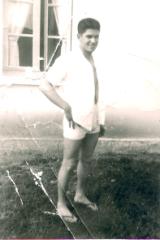
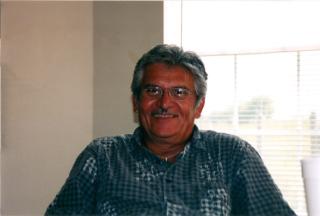
Where did you parents go to school? Did they graduate?
If they went to school at all, dad went to the third and mom maybe went to the first. Mom was in Natalia, Texas. And dad was in Devine, Texas.
Was it ever almost too hard to survive?
With mom and dad, as I am trying to remember, it was because as a service station attendant or foreman, they didn't pay my dad that much. That is why we lived with my grandma and grandpa. We were ok, because you would have two families, three families, living in a house with you, you could survive. But as far as clothing and shoes were concerned, and necessities of life like brushing your teeth and soap and stuff like that, it was kinda hard. Sometimes we would go without bathing for a week or two or maybe longer. We didn't eat meat all the time and when we did it was chicken because it was cheaper and hamburger meat. It was hardly ever steak. Mostly it was beans, fideo, rice, mostly and potatoes. But dad managed to keep food on the table, even if we had to be limited. As far as starving is concerned, if there was a time, I don't remember it.
Growing up in a family that worked as migrant laborers in your earlier years, do you feel that you missed out on anything important?
Not as far as I am concerned. I was happy with the life I had. I had my mom and dad and they never mistreated us, although, we got spanked at least twice a day, until the age of thirteen, whether we needed it or not. No, I don't think I missed very much. I didn't miss much school either because they made sure I went.
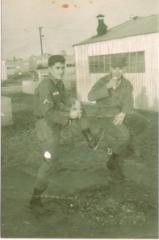
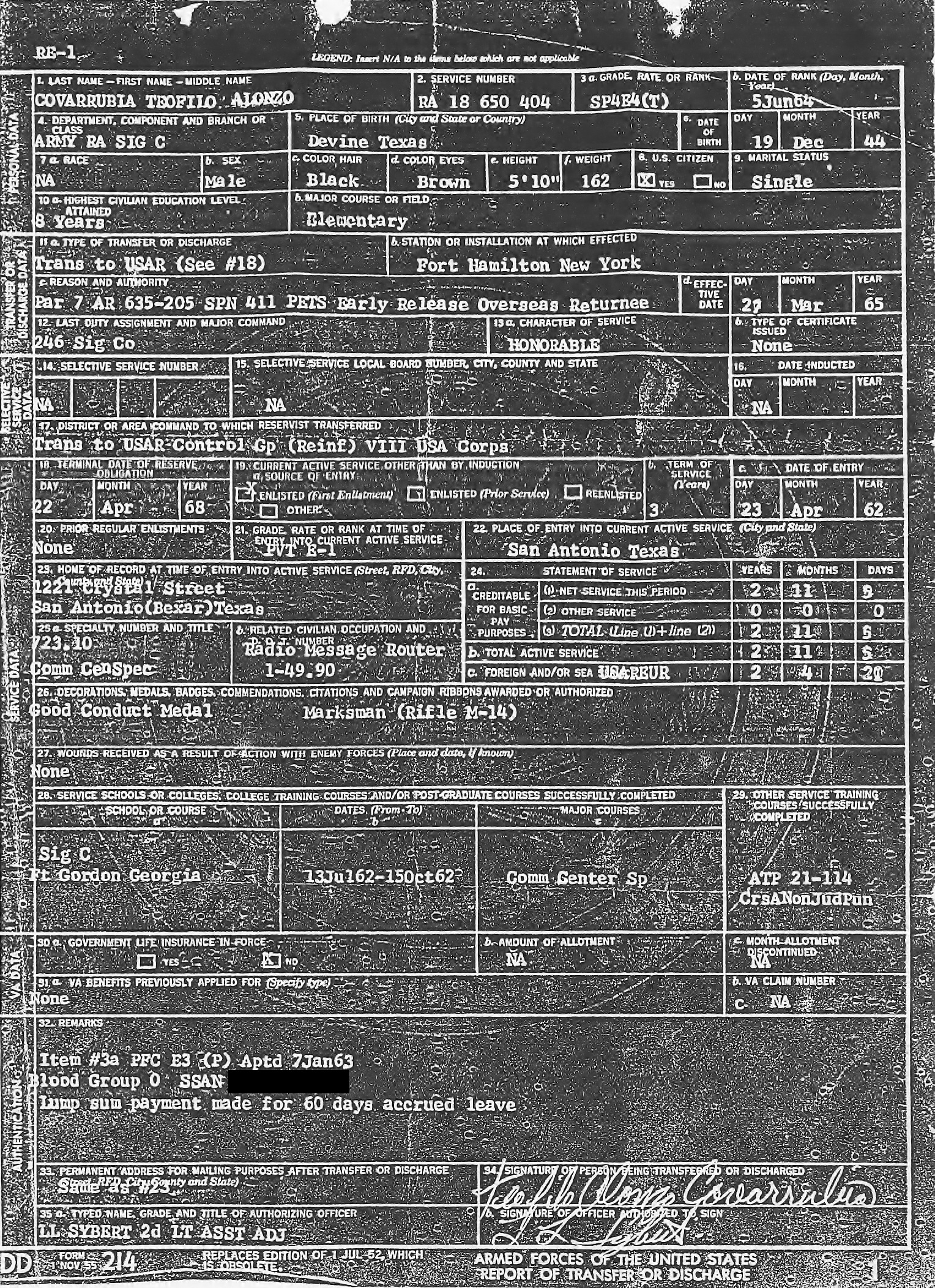
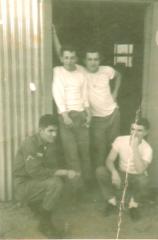
Were there any gangs when you were growing up?
The gangs started when I was in Ollie Perry Storm School. There were a lot of different gangs, especially in school even though it was elementary school. There were older ones that were teenagers, and there were older ones still, like 20 or 21. Most of them had brothers, older brothers, and since the older brother was in the gang the younger would be in the gang too. Some of them weren't but most brothers were. Like me, I was one of the taller ones and, even being Hispanic, I had a pretty good build, slim, and I looked better then a lot of them. And they wanted me to join a gang, but I didn't want to. Every other day I would get a beating, not real bad, but you know. I would get a couple of punches and kicks in. Then I would wait and catch one of them by themselves, one of the gang members, and I would beat them up. But of course the next day I would get a beating because I did that. All of the gangs said that if I didn't join when I got to junior high, they were going to give me a good whooping or something like that, or maybe kill me. So I told my mom and my dad that I didn't want to go to school anymore because of that. Most of the days, I would run home, because of the gangs. There was maybe, if I was lucky, one day a week when I didn't have to run home. My sister didn't have to worry about it because she was a girl. I joined patrols at Ollie Perry so that I would be under watch by the teachers. They watched us to make sure we did our job right, not because of the gangs. I would see the gangs waiting for me and I knew as soon as I was done I would have to run. When I told the teachers they would tell me that it's alright, they aren't going to do anything. So they sent me to Devine to live with my uncle.
What is your fondest memory?
My fondest memory was my family: my brothers and sisters, my mom and dad. I don't know how my brothers and sisters felt but I really loved them, and I enjoyed being around them. Another would be going on vacations to New Mexico. As I grew older, it was when we would go to Playland Park. And when the carnival came to town, I would ride the merry-go-round on the Shetland ponies and I always thought about buying myself horses when I grew up.
Is there anything that you would want to go back to change or fix?
I would like to go back and learn how to write papers in English better. It would always confuse me in school. I would also like to have finished college. I had about a year into college but I didn't finish. I also would like to change the fact the mother broke her neck and we almost lost her. When I was living in Devine because of the gangs, the family would come down to visit on the weekend and the one time they were going back to San Antonio my mother was driving and the left front tire blew out causing the car to flip I don't know how many times. It threw everyone out. My mom I think stayed in the car and what happened was, they were driving a 1953 Chevy, which was kinda long and right where she was sitting, there was a point that came straight down where her head would have been and that is what broke her neck. The only reason she was saved basically, was there was a state trooper behind them and saw the whole thing. She was in a striker bed for so many months and her head looked like a big ol' pumpkin, not like a basketball because it was bigger than that like a pumpkin. I think that is when my older sister wasn't going to school for a while, at least she was taking care of us for a while. And she had to do all the cooking and all the washing. When my mom finally came home, she had a cast that looked like what the queen wears. The cast came down her chest, over her shoulders, and behind her head. And I was real heavy. I would also like to change that one of my sisters died as a baby in New Mexico. Also the second to youngest sister was shot right between the eyes while she was working. I would of loved to have changed that too.
What part of San Antonio did you live in most? What was the neighborhood like?
We lived mostly on the south side of town. The neighborhood was like ghetto type because you would see junk in the yards; weeds growing everywhere because nobody was well off enough to actually buy a lawn mower and those that had a little more money than the rest, working at civil service and other better jobs. The houses were brand new if you could afford to buy one. You would see a lot of beer drinking on the front porches, bar-b-queuing. It was almost like a movie that you would watch today where people would drive through something like Spanish Harlem, with the chain link fences or white wooden fences. Some of the houses didn't even have grass, it was all dirt.
Looking back at your entire life, how do you think you did?
I don't know what anyone else would give but I would give myself an A+. Because I have a great family, great grand kids, great in laws, son in law, daughters in law. I mean we may not live an affluent life but we're healthy, we do for each other, we think of each other, and we try to keep our families as close as we can. But I think my life has been great even though I have been married three times.
People say that everyone knows where they were when John F. Kennedy was shot. Where were you?
I was in the Armed Forces. I will leave it at that.
I remember you saying that you don't like Elvis. Why is that?
Because everyone treated him like a god and he wasn't. Even though I liked some of his songs, I didn't like him as a person. He was also very prejudiced.

Of all the places that you have been, other than San Antonio, where would you like to live again? Why?
I'd like to live at the bottom of the mountains of Las Cruces New Mexico because everyone was real nice when we went there. Even when we would go sightseeing, everybody was really nice. They had a certain language about them, the way they talked, not like Texas. When my wife retires, because I am retired already, I would ask her to see if she would like to move to New Mexico. And if not, then the next best place would be living out in the country.
Is there anything else you would like to add to this interview?
It would be that I thank God for giving us what we have, or, well, giving me what I have: experiences, families, my children, my grand children. For the life I've led, even though I have been married three times, divorced twice. I think it turned out for the better.

